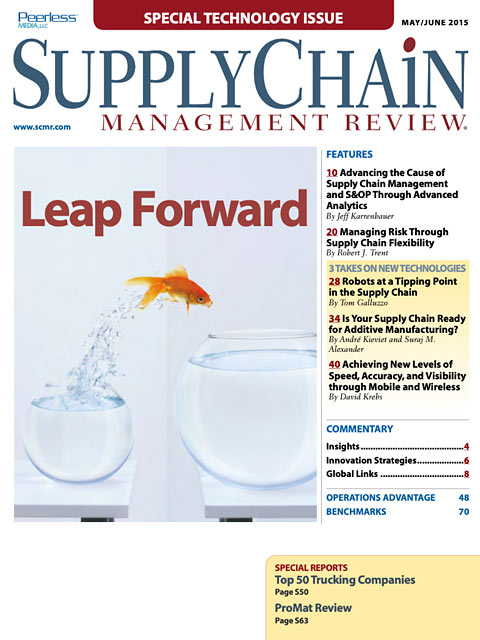Sorry, but your login has failed. Please recheck your login information and resubmit. If your subscription has expired, renew here.
May-June 2015
As supply chain managers we are challenged year in and year out to figure out new, innovative ways to improve our operations. We have to translate educated guesses about what’s next into new investments in our processes. Such may be the case with robotics, 3D printing and additive manufacturing, and investments in new mobile technologies. However, successful planning, including planning for risk, resiliency, and flexibility, can help prepare you for whatever is next. Browse this issue archive.Need Help? Contact customer service 847-559-7581 More options
The United States’ effort to remove Cuba from the list of states that sponsor terrorism is a limited but significant step likely to lead to the reopening of embassies, say trade analysts. But the overall engagement will still be limited by the U.S. embargo. Risk management experts are tracking the issue closely.
Air cargo carriers are likely to increasingly request permission to start scheduled services, and agricultural exporters are seeking greater flexibility to obtain credits, analysts say. These gradual measures can also present a more favorable outlook for Cuba’s newly developed super-container port of Mariel and the special economic zone that is to open around it.
“This is a limited but significant step that will move the bilateral relations toward appointing top-level diplomatic representation in each country by reopening embassies, but will still be limited by the U.S. embargo,” says Diego Moya-Ocampos, a senior analyst with IHS Global Insight.
SC
MR
Sorry, but your login has failed. Please recheck your login information and resubmit. If your subscription has expired, renew here.
May-June 2015
As supply chain managers we are challenged year in and year out to figure out new, innovative ways to improve our operations. We have to translate educated guesses about what’s next into new investments in our… Browse this issue archive. Access your online digital edition. Download a PDF file of the May-June 2015 issue.Ukraine, roiled by conflict with neighboring Russia, poses significant challenges for companies considering expanding their supply chains there. So does Thailand despite the years that have passed since the popular manufacturing destination’s devastating floods.
Exactly what risk do these countries present? Their vulnerabilities, as well as those of many other countries, are quantified in the definitive ranking of supply chain resilience around the world, the 2015 FM Global Resilience Index.
Ukraine fell 31 places in this year’s FM Global Resilience Index to 107th, the biggest year-over-year fall in the rankings, owing directly to Russian military intervention there. This worsening political risk and a weakened infrastructure are the main negative factors affecting the rank of Europe’s largest country.
Thailand, one of the world’s top exporters, fell 20 places to 82nd of 130 countries and territories examined. In particular, the ranking reflects poorer perceptions of the country’s infrastructure (e.g., transport, telephony and energy) and the quality of local suppliers as well as a decline in political stability and the quality of fire risk management. These matters compound the misery of the country’s 2011 floods that wreaked an estimated $45 billion in losses and business disruption worldwide.
There was good news, however, for Taiwan. It soared 52 places in the annual rankings to 37th overall, a bigger rise than any other country. Its ascension is mainly due to a substantial improvement in the country’s commitment to risk management, as it relates to both natural hazard risk and fire risk.
Updated annually by commercial property insurer FM Global, the data-driven 2015 FM Global Resilience Index gauges resilience (the flipside of risk) along nine dimensions. The Index compiles vetted data from sources such as the International Monetary Fund, World Bank, World Economic Forum and FM Global’s database of more than 100,000 client locations. Countries and territories examined are ranked from most to least resilient.
Norway is ranked #1 in the Index as the country best suited for companies seeking to avoid disruptions in their global supply chain operations. Venezuela ranked last on the list of the 130 countries and territories listed. The three regions of the United States – East, Central and West – all rank in the top 25.
The London-based analytics and advisory firm, Oxford Metrica, compiles the information for FM Global. According to Dr. Deborah Pretty, principal at Oxford Metrica, the index provides a “unique and compelling” look at how 130 countries and territories stand up to supply chain disruption.
“CEOs, CFOs and other decision makers can now make informed investments knowing the vulnerability of these countries to supply chain disruption and their ability to recover from it,” she adds.
In an interview with SCMR this week, Pretty noted that this is the second time her firm has helped FM Global with the research.
“In the past this information may have been primarily target to a company’s supply chain manager, but we see the data moving up the chain to the C-suite,” she says. “We suspect this information will also be used to determine how much insurance may be needed to cover exposure in nation’s with a multiple risk profile.”
SC
MR

Latest Supply Chain News
Latest Podcast

 Explore
Explore
Latest Supply Chain News
- A reshoring history lesson
- Strategic cost savings differ from cutting costs
- Planning fatigue may be settling in
- Inflation, economic worries among top supply chain concerns for SMBs
- April Services PMI declines following 15 months of growth, reports ISM
- Attacking stubborn COGS inflation with Digital Design-and-Source-to-Value
- More latest news
Latest Resources

Subscribe

Supply Chain Management Review delivers the best industry content.

Editors’ Picks






